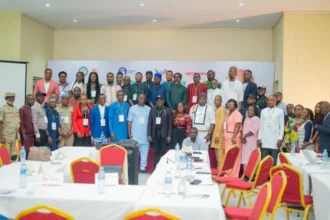A Rivers State High Court in Port Harcourt High, has dismissed a N5.074 billion suit filed by Macobarb International Limited, an indigenous contractor, against the Nigerian Liquefied Natural Gas (NLNG) for breach of contract and accumulated losses.
Owing to this, the Chief Executive Officer of Macobarb, Shedrack Ogboru, who filed the claims since 2022, as one of the claimants, in suit number HC/2013/CS/2022, however, cried out, saying the fate of indigenous contractors in Nigerian courts was doomed.
Ogboru told journalists outside the courtroom after the ruling that the judge allegedly ignored the crux of the matter and the terms of the contract to deny Macobarb the claims.
Expressing anger and frustration, Ogboru said he felt he presented a tight case to the court to show that the NLNG allegedly breached the terms of payments and that the breaches caused a slowdown of the execution of the contract, but regretted that the judge did not agree with any of his arguments.
Saying many indigenous contractors have died as a result of injustices at the hands of the oil majors, Ogboru said that only abroad do communities and local contractors get some form of justice, never in Nigeria.
The trial Judge, Justice Chinwendu Nwogu, had ruled that the NLNG did not breach its contract with the contractor and that the gas company did not unlawfully deny Macobarb payments.
The judge said work executed by Macobarb did not amount to ‘work done’ as stated in the contract terms except the NLNG approved it as so, and that the provision mandating the person recognised as ‘contract holder’ nominated by the NLNG as the one to authorize any dealings with the contractor did not mean that he alone could act for the NLNG as relied upon by the contractor.
The judge ruled that the ‘contract holder’ was a mere day-to-day overseer of the project, and that any official mandated by the NLNG can terminate the contract.
The judge also ruled that the contract did not provide for a ‘stand-down payment’ and that the NLNG did not cause delays in the execution of the contract as claimed by the contractor.
The judge further ruled that the payment failures by the NLNG that the contractor claimed affected the contract did not amount to an offence or breach of the contract, but that the contractor had misused the loan he obtained from banks.
In the end, the judge ruled in favour of the grounds submitted by the NLNG.
Reacting, Ogboru said: “My case is presented 100 percent, the NLNG’s case is zero; but surprisingly, the NLNG has rather been upheld, and Macobarb denied. I pity indigenous contractors in Nigerian courts. We are doomed.”
Macobarb had dragged the NLNG to court claiming over N1billion (later amended to N5.074 billion) for alleged breaches to a contract (B130142PPI, Access Control) in the NLNG plant area with three years duration.
The suit said the contract provided that Macobarb be paid bit by bit progressively based on the value of verified work done.














